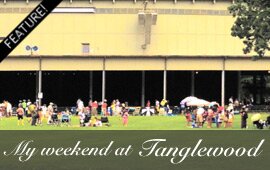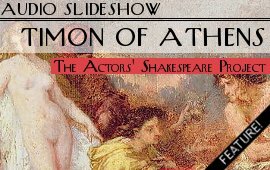It’s long past the short run of ‘s production of Tom Johnson’s 1972 The Four-Note Opera, but I owe a few words to this hilarious show from a company that’s doing big things in the fringe opera scene. This production marked the close of their season, as they move to rename and re-orient themselves (and I presume expand) as Hub Collaborations, whose revised mission has not yet been stated. For a company that started four seasons ago by putting on Idomeneo in a church basement and most recently took over the BCA Plaza Theatre, they’re growing quickly and putting themselves on the map. Their shows have a youthful energy and edge–things that aren’t easy to come by in the opera world–without being awkwardly fringy. They’re setting an admirable example of young people coming together and making art happen with their sights set high and the talent and assiduity to match. I’m sure we can look forward to more and better work and an enlarged mission as they move forward under this new heading, so keep your eyes on their for updates and shows.
Tom Johnson’s The Four-Note Opera is a one-hour spoof on the conventions of opera. You’d think anyone looking to parody the form would poke fun at its love triangles, stock characters, and plot holes, but Johnson takes a different route. Characters, hilariously performed by a cast that well over-shadowed some of the park and barking we sometimes even see on Boston’s main operatic stages, named only for their voices (a soprano, tenor, baritone, bass, and a mezzo-soprano) sing inner monologues complaining of a lack of stage time, boredom, and discomfort. These are inside jokes, but the humor is as accessible as YouTube’s .
Other than literally describing itself and putting back-stage antics on stage, Johnson’s libretto is about duration and the repetitious nature of opera. Entire arias are made up of nothing but counting off measures, bars, and variations. There are others about waiting and others about repetition. An entire aria surrounds a single strike of a woodblock. There are lyrics about note length; “I sing the short notes,” “I sing the long notes,” etc. In the last chorus the characters, all of whom have at this point died at the hands of the lethal and suicidal ribbon-dancing soprano (I’m not sure if OperaHub added the ribbon dancing or not), complain in tedious, but very funny repetition about their uncomfortable final positions and the length of the scene. (They’re the ones waiting for the show to end!) Sometimes it’s like the counting in Einstein on the Beach, but just not so heady.
As the opera’s title suggests, the score is Minimalist. At one point the harpsichordist (the only instrumentation) struck the same chord over and over. Even this seemed to be in parody. The music itself is nothing special and that’s probably why this worked so well for OperaHub. Fringe productions always suffer when they try to assemble a full and capable and well-rehearsed orchestra without the required payroll. What makes The Four-Note Opera so good, other than its laugh-out-loud comedy, is its answer to finding a Minimalist narrative that fits a Minimalist score, without being tiresomely abstract.
To complement Johnson’s brilliant pairing of Minimalist music with a comic and reductive meta-narrative, set designer Stephen Dobay pulled together a clever set that exposed a “back stage” area where singers warmed up, drank water, and thumbed through the score. were marked not only with tape, but with signs reading “spike.” Other signs labeled the harpsichord, the supertitle screen (although there were no supertitles). Boxy geometric sculptures sat on stage as icons to the Minimalist movement like the abstracted walls common to much contemporary opera scenery.
You should be sorry if you missed this, as OperaHub should be your first stop if you want to step away from the Theatre District warhorses.




About 1980 I served as the pianist [we didn’t have a harpsichord] for several performances of The Four-Note Opera. It was just about the most fun I ever had on stage or off. An [appropriately-named] eclectic group of madcap singers and a director and producer went to work on hilarious stage actions and settings [minimalist, of course] that included cleverly conceived parodies of typical ‘grand’ opera stagings. The singers had to wayyyy – overlearn the music so the stage actions would at least work out within the parameters of the arias & recitatives. As accompanist I had to mark my music with notes to myself like ‘just keep playing this till she puts the poison in the teacup’, or ‘You MUST wait and hold this chord or repeat it for Jim to finish the miming of the snake-bite’.
There was a fine grand piano on the back stage-right corner of a big-enough stage. I was visible all the time and sometimes became a personage in a scene, always as the pianist, of course. The production company called itself ‘OPERA CASALINGA’ [Italian slang for ‘home-made’ or ‘thrown-together’ opera company.
I hope someday to see a production of this wonderful and unique thing, and hope you will not miss it; you will not miss it; you will not miss it. <=if you don't miss it, you will understand that statement!